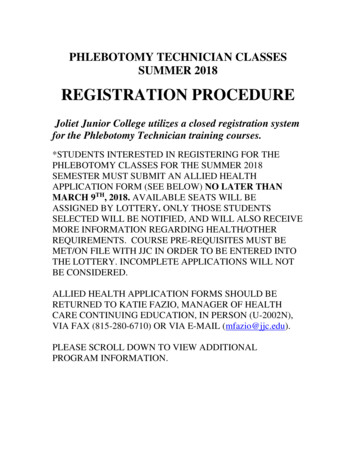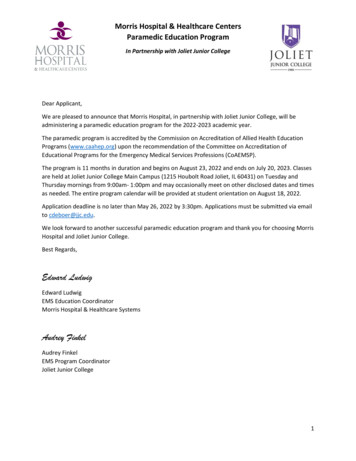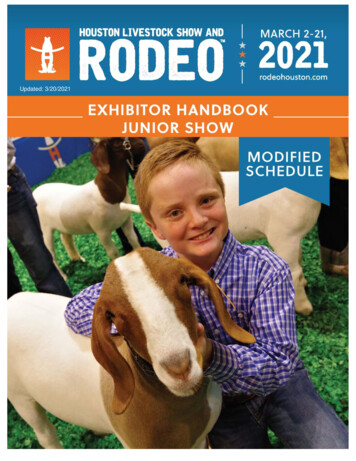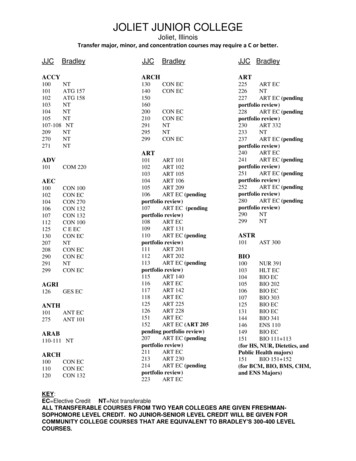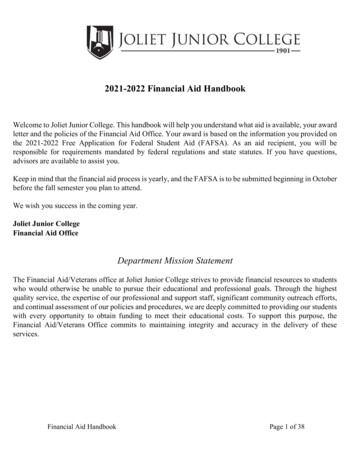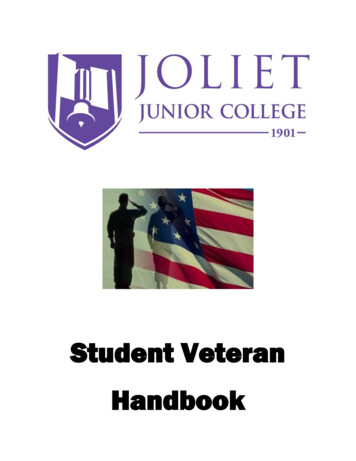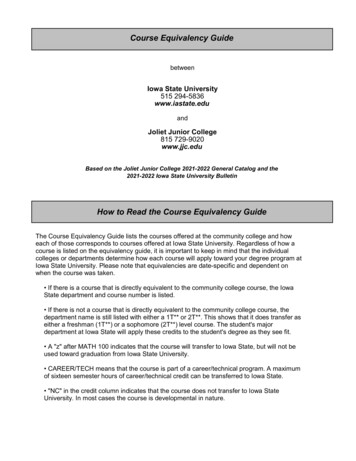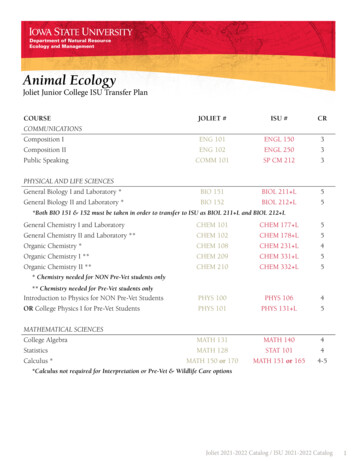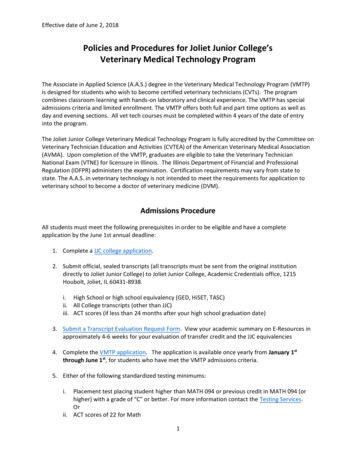
Transcription
Effective date of June 2, 2018Policies and Procedures for Joliet Junior College’sVeterinary Medical Technology ProgramThe Associate in Applied Science (A.A.S.) degree in the Veterinary Medical Technology Program (VMTP)is designed for students who wish to become certified veterinary technicians (CVTs). The programcombines classroom learning with hands-on laboratory and clinical experience. The VMTP has specialadmissions criteria and limited enrollment. The VMTP offers both full and part time options as well asday and evening sections. All vet tech courses must be completed within 4 years of the date of entryinto the program.The Joliet Junior College Veterinary Medical Technology Program is fully accredited by the Committee onVeterinary Technician Education and Activities (CVTEA) of the American Veterinary Medical Association(AVMA). Upon completion of the VMTP, graduates are eligible to take the Veterinary TechnicianNational Exam (VTNE) for licensure in Illinois. The Illinois Department of Financial and ProfessionalRegulation (IDFPR) administers the examination. Certification requirements may vary from state tostate. The A.A.S. in veterinary technology is not intended to meet the requirements for application toveterinary school to become a doctor of veterinary medicine (DVM).Admissions ProcedureAll students must meet the following prerequisites in order to be eligible and have a completeapplication by the June 1st annual deadline:1. Complete a JJC college application.2. Submit official, sealed transcripts (all transcripts must be sent from the original institutiondirectly to Joliet Junior College) to Joliet Junior College, Academic Credentials office, 1215Houbolt, Joliet, IL 60431-8938.i. High School or high school equivalency (GED, HiSET, TASC)ii. All College transcripts (other than JJC)iii. ACT scores (if less than 24 months after your high school graduation date)3. Submit a Transcript Evaluation Request Form. View your academic summary on E-Resources inapproximately 4-6 weeks for your evaluation of transfer credit and the JJC equivalencies4. Complete the VMTP application. The application is available once yearly from January 1stthrough June 1st, for students who have met the VMTP admissions criteria.5. Either of the following standardized testing minimums:i.Placement test placing student higher than MATH 094 or previous credit in MATH 094 (orhigher) with a grade of “C” or better. For more information contact the Testing Services.Orii. ACT scores of 22 for Math1
Effective date of June 2, 20186. Completion of the following courses with a grade of “C” or better:i.ii.iii.iv.v.vi.ENG 101 or ENG 102;Introductory Level Social Science course;BIO 100;BIO 149 or BIO 151 (general Biology);BIO 240 (which has a pre-requisite of BIO 149 or BIO 151);COMM 101 or COMM 202 or COMM 203 or COMM 2047. Consult with the admissions specialist (815) 280-2247 or meet with a vet tech advisor (815) 2802746.8. Applicants will receive an email notification from a JJC email account acknowledging receipt ofthe application.Ranking ProcessDue to the large volume of applicants relative to the number of available positions in the program, apoint ranking system will be used to determine acceptance into the VMTP. Each eligible application will be given a number for anonymity and demographic data will beremoved from the advisor summary. Applicants will be scored and ranked based on:oCalculated GPA based upon the grades for prerequisite general education classes (ENG 101or ENG 102, BIO 100, BIO 149 or BIO 151, BIO 240 and COMM 101 or COMM 202 or COMM203 or COMM 204) (weighted 50%). If a student has received course credit for any classwhere there is no grade given, the student’s grade for purposes of awarding points will becounted as a “C”.oPercent credit hours completed (weighted 25%)oExperience (weighted 25%) (Veterinary/animal experience form): Veterinary/Animal Research experience. Any paid or volunteer work performed in aveterinary or research facility, including job shadowing, and observation. Students maysubmit up to a total of 80 hours to receive a maximum of 9% overall consideration.Students submitting less than 80 will receive a prorated proportion of that 9%. Animal experience. All verifiable animal care and training experience, including 4-H,FFA, Wilco Vet Assistant course and kennel/boarding facility work. Please complete theentire form to verify these experience. Verification 2.5% of overall consideration. Successful completion of NAVTA approved/ICCB governed Veterinary AssistantCertificates. Completed certificate 9% of overall consideration.2
Effective date of June 2, 2018 Successful completion of the Joliet Junior College LLC 119 course, Orientation toVeterinary Technology. Successful completion of class 4.5% of overall consideration.oProof of residency. In-district students have first right of admission and will be awardedtwenty five (25) additional points in the ranking process. Students must meet residencyrequirements as defined by Joliet Junior College for “in-district” status. Out of districtstudents will be admitted if spaces are available.oIn the event that one or more of the students who are notified of being accepted into theVMTP indicate that they do not intend to accept the seat or wish to defer, the vacancy willbe filled by remaining applicants based on the rank score earned.oIn the event that there are insufficient qualified candidates who have applied by June 1st,there will be a special provisions program. Under this program, students can makeapplication and complete all of the prerequisites until the end of the summer semester.Should space remain in the next class after exhausting the special provisions program, anylate qualified applicants will be reviewed by the Program Director with the intention offilling the space for the next class.oIf a student is not admitted to the program for the fall of that year, a student would have toresubmit their application to be considered for the following academic year. Allprerequisites previously completed are accepted in subsequent application years.Admission criteria is subject to change. It is the applicant’s responsibility to review the criteriaon a regular basis.9. Students will be notified via JJC Student Email of their acceptance into the program and a JJC emailaccount will be used for notification. Acceptance emails are typically sent mid-June.10. Upon acceptance into the VMTP all students are required to attend a group orientation in July of theyear in which they are accepted. Below is some information about the orientation:i.The group orientation will take 6 hours.ii. Students will be given their fall semester schedule. Students will only be registered for classesafter completing the orientation.iii. Students will learn about the program’s expectations and rabies vaccination requirements.Registration1. The VMTP secretary will register students in any VET courses after acceptance into the programand ONLY after completing the program’s orientation.2. A minimum grade of “C” is required for all prerequisite course work, general education coursesand Veterinary Medical Technology sequence courses.3
Effective date of June 2, 2018Fail/Withdrawal and Appeals PoliciesFail/Withdrawal Policies:A student who withdraws failing or fails a VMTP course may repeat that course one time only withoutappealing to return to the program. If the student is unsuccessful more than once in a course, thestudent can appeal to repeat the course for a third time - see appeal process. In the case of appeal, thestudent may continue in the program pending the outcome of the appeal. However, when a studentfails a VMTP sequential course (VET 110, VET 117, VET 118, VET 128, VET 140) or a pre-requisite course(see catalog), that course must be successfully completed before being enrolled in the next course in thesequence. Additionally, the vet tech program must be completed within 4 years of the date of entryinto the program. If not a sequential or pre-requisite course, the student may continue in the programaccordingly. Students may only appeal the same class once. If a student is unsuccessful following anappeal, the student will automatically be dismissed from the VMTP.1.Not all courses are offered every semester. Acceptance into the course, and the followingsequence of courses, depends on class offering and available seats.2.Students who withdraw from any required course in the VMTP are automatically withdrawnfrom the VMTP program. To officially drop or withdraw from a course, the student must notifythe Office of Registration in writing by completing the add/drop form. Failure to officiallywithdraw by the drop date will result in a failing grade(s). Drop dates for each course vary andare stated on the student’s class schedule which can be found under e-Resources on JJC’s website.3.Students who breach the VMTP Handbook, the Student Code of Conduct, the Academic HonorCode, will be immediately suspended pending investigation. The VMTP handbook is given tostudents after orientation.4.Students who wish to withdraw temporarily from the program for a medical, pregnancy, orparenting reason should meet with the Dean of Students to discuss options.5.Exceptions will only be made for students who withdraw while passing and request to postponefor a semester or longer (e.g., due to medical, financial hardships, etc.) before continuing in theVMTP sequence will be allowed to do so, space permitting, as long as the absence is less thantwo calendar years. (See “Time Limits on Readmission” section below). Students returning mustcomplete the current VTMP curriculum if there have been changes.6.Students withdrawn for nonacademic reasons may be reinstated following the proceduresunder the VMTP Reinstatement Procedure below.7. Readmission is not guaranteed.8.A student who is denied readmission for reasons other than seat availability has the right toappeal for readmission in writing to the Veterinary Medical Technology Admissions AppealCommittee. All decisions made by the Veterinary Medical Technology Admissions Appeal4
Effective date of June 2, 2018Committee are final. This committee consists of the Dean of Career and Technical, DepartmentChair, the VMTP Program Director and VMTP faculty.Time Limits on Readmission:1. Students seeking readmission to the program, following a time lapse of more than two calendaryears, but less than 3 calendar years, will be required to demonstrate proficiency via tests or labskill assessment prior to readmission into subsequent courses of study.2. A student seeking readmission, who has been out of the program for more than three calendaryears, must start from the beginning of the program unless approved by the VMTP Director forextenuating circumstances (i.e. active military duty). In this event, the requirements in thissection still apply.3. In the event of major course changes, a student will be required to start from the beginning ofthe Veterinary Medical Technology sequence, regardless of time lapse. Each case will beevaluated on an individual basis. The Dean will make the decision on what constitutes a majorchange.4. Upon readmission students must pay current College and VTMP tuition and fees regardless ofprior tuition and fees paid.Appeal Process:The JJC VMTP has an appeal process for vet tech students appealing to get back into the VMTP. Theappeals process is as follows:1. The student must notify the Program Director in writing that an appeal is being requested withinone year of exiting the program.2. The Secretary of the VMTP will provide the student with the appropriate paperwork andschedule an appointment with the Appeals Committee.3. The Appeals Committee will be comprised of JJC faculty. A reasonable attempt will be made toinclude faculty from the VMTP and from other departments at the college.4. The committee will be comprised of an odd number of faculty in the case of a vote.5. The Appeals Committee will meet at least once per semester at a time, as needed, designatedby the Program Director.6. The Appeals Committee will determine the conditions, if any, under which the student cancontinue in the program.7. The student will be notified of the decision in writing within 5 business days.5
Effective date of June 2, 20188. The decision by the Appeals Committee is final.9. An appeal granted or denied constitutes the final opportunity for a student to complete theVMTP. If a student is unsuccessful in any vet tech course following an appeal, there is no otheroption for readmission.Technical StandardsThe VMTP has established technical standards to be considered in the enrollment/admissions process inan effort to provide a framework to balance several competing interests:1. The rights of applicants and students;2. The safety of students, their co-workers, and veterinary patients;3. Fulfilling the clinical training component of the curriculum;4. Successfully completing the American Veterinary Medical Association requirements foraccreditation;5. The conditions for licensure or certification of the VMTP graduates.These competing interests and the nature of veterinary educational activities may prevent someprospective and current students with disabilities from qualifying for enrollment or continuedenrollment in the VMPT at Joliet Junior College.The technical standards set forth in this document are the minimum standards that allow an individualto perform at the lowest acceptable level in the required activity having the highest, greatest, or mostcomplex requirement for the designated sense, function or characteristic.Applicants and students must be able to satisfy, with or without the use of appropriate auxiliary aids(including prosthetic devices)1, the following technical standards:If one aid or prosthetic device interferes with a second aid or prosthetic device needed to carry out asingle act, then the individual may be restricted in meeting the technical standard.16
Effective date of June 2, 20181. OFFICE AND HOSPITAL PROCEDURES, CLIENT RELATIONS, and COMMUNICATIONManagementSkill: Participate in facility management utilizing traditional and electronic media andappropriate veterinary medical terminology and abbreviations.CommunicationSkill: Communicate in a professional manner in all formats - written, oral, non-verbal, andelectronic.Laws and EthicsSkill: Follow and uphold applicable laws and the veterinary technology profession's ethical codesto provide high quality care to patients.2. PHARMACY and PHARMACOLOGYAdministrationSkill: Safely and effectively administer prescribed drugs to patients.DispensingSkill: Accurately dispense and explain prescribed drugs to clients.3. NURSINGPatient assessmentSkill: Demonstrate and perform patient assessment techniques in a variety of animal species.Patient careSkill: Understand and demonstrate husbandry, nutrition, therapeutic and dentistry techniquesappropriate to various animal species.4. ANESTHESIAPatient managementSkill: Safely and effectively manage and maintain patients in all phases of anesthesia.Equipment/facility managementSkill: Safely and effectively select, utilize and maintain anesthetic delivery and monitoringinstruments and equipment.7
Effective date of June 2, 20185. SURGICAL NURSINGPatient managementSkill: Understand and integrate all aspects of patient management for common surgicalprocedures in a variety of animal species.Procedural managementSkill: Understand and provide the appropriate instruments, supplies and environment tomaintain asepsis during surgical procedures.6. LABORATORY PROCEDURESSpecimen managementSkill: Demonstrate knowledge of proper handling, packaging and storage of specimens forlaboratory analysis to ensure safety of patients, clients, and staff.Specimen analysisSkill: Properly perform analysis of laboratory specimens7. IMAGINGSkill: Safely and effectively produce diagnostic radiographic and non-radiographic images.8. LABORATORY ANIMAL PROCEDURESSkill: Safely and effectively handle common laboratory animals used in animal research.9. AVIAN, EXOTIC & SMALL MAMMALS PROCEDURESSkill: Understand the approach to providing safe and effective care for birds, reptiles,amphibians, guinea pigs, hamsters, gerbils, and ferrets.Joliet Junior College does not discriminate against qualified students with disabilities who apply foradmission to or who are enrolled in the Veterinary Technology program. Otherwise qualified studentsshall not be excluded from admission or participation in educational programs, services and activitiessolely by reason of their disability or medical condition. Joliet Junior College provides reasonableaccommodation in its academic programs to qualified students with disabilities. A reasonableaccommodation is one that does not require substantial modification of essential program requirementsor lower academic standards, consistent with legal standards and institutional policy.Registration with Disability Services is necessary for students to receive accommodations. Registration isthe student’s responsibility. Students must present their Notice of Accommodation to their instructors.All applicants and enrolled students are held to the same academic and technical standards of admissionand training, with reasonable accommodations as needed for students with disabilities. The VeterinaryTechnology program and Disability Services will engage in an interactive process with students withdisabilities in order to provide equal access.8
Effective date of June 2, 2018Veterinary Medical Technology Program Essential QualificationsStudents matriculating in and graduating from a Joliet Junior College health career program must beable to meet the Essential Requirements of the academic program and must not pose a threat to thewell-being of patients, other students, staff, or themselves. As an incoming veterinary technologystudent you will need, at a minimum, the following types of skills and abilities and will need to maintainand demonstrate these abilities throughout the program.The student must have the ability to perform the following with or without reasonableaccommodations:Essential Qualifications BehaviorsCognitive Effectively engage and contribute in decision-making within a vation Ability to problem-solve in any situation Function within significant time constraints and meet deadlines Maintain professional behavior and attitude at all times Demonstrate high level of integrity and honesty Communicate empathy to clients and for patients Understand and commit being a patient advocate Stoop, bend, reach, pull and push with full range of motion of bodyjoints Lift and/or carry a max of 50 pounds on a daily basis Handle, install, position and move materials, equipment, and supplies Handle, position, and restrain live animals of all types of species Assist with and perform a wide variety of routine medical, surgical, anddiagnostic procedures common to the veterinary setting Communicate effectively in a rational, coherent manner with clients,families, peers, colleagues and faculty Comprehend and carry out complex written and oral instructions,accurately and in a timely manner Maintain accurate patient records Examine and critically analyze images or other forms of output createdby diagnostic equipment Observe and assess a patient sufficiently to assist and perform9
Effective date of June 2, 2018diagnostic procedures and patient monitoringBehavioral/EmotionalProfessional ConductCriminal BackgroundChecks Remain focus under difficult and emotional situations Communicate empathy for others Organize and efficiently use the time to prepare for class and clinical Attend classes and clinical assignments in a timely manner Maintain client-patient confidentiality No disqualifying conditions according to requirements for licensure as aCVT in the state of Illinois, on admission or throughout the programIf you have any concerns regarding these standards, please contact Eileen McKee, CVT; Program Directorat 815 280-2752.Legal Limitations for Veterinary MedicalTechnician LicensureGraduates of an accredited program are eligible to take the National Veterinary Technician boardexamination.Applicants should be aware that there are legal limitations for veterinary technician licensure.Candidates who successfully complete this examination may or may not be issued a license to practiceveterinary technology in Illinois. The Division of Professional Regulation of the IDFPR reviews allapplications. The following are reasons that may serve as a denial of licensure, but are not intended tobe all-inclusive: Denied a license permit or privilege of taking an examination by any licensing authority or had alicense encumbered in any way.Been convicted of a criminal offense in any state or federal court. A physical impairment or disability that could interfere with Veterinary Medical Technology. An addiction to, or excessive use of alcohol, narcotics or habit-forming drugs. Suffered from, been diagnosed as having or have been treated for any disease or conditionregarded as chronic, whether physical, emotional or mental.Potential applicants with questions regarding veterinary technician licensure may wish to contact theIDFPR at 1-800-560-6420 or visit the IDFPR Veterinarian Professionals page athttp://www.idfpr.com/DPR.asp10
Effective date of June 2, 2018Support ServicesSupport services are available to JJC students. These include: Advising of prospective and current students, please call (815) 280-2247 for the admissionsspecialist or (815) 280-2746 to schedule an advising appointment. The Testing Services provides tutoring, quiz bank, test taking skills sessions, and study skillshelp. Assistance with reading, writing, and note taking are also available here. Forinformation please call (815) 280-2284. Students may apply for financial aid assistance through the Office of Financial Aid and VeteranServices. For information please call (815) 280-2528. The College provides Special Needs Services through the Disability Services office. Forinformation, call (815) 280-2230 or 280-2613. It is important to notify the Disability Servicesoffice prior to the start of the semester in which you enroll at JJC. The office of Career Services can assist students with locating part-time employment whileenrolled, career decision-making assistance, and job placement at the time of graduation. Forinformation please call (815) 280-2756.11
Effective date of June 2, 2018AG 500VETERINARY MEDICAL TECHNOLOGY PROGRAMASSOCIATE IN APPLIED SCIENCEThe Associate in Applied Science (A.A.S.) Degree Veterinary Technology Program at Joliet Junior Collegeis designed for the student who wishes to become a Certified Veterinary Technician. The programcombines classroom experience with clinical experience in community veterinary hospital facilities.A student who completes the program is awarded an A.A.S. Degree and is eligible to take the NationalExamination for Veterinary Technicians and obtain licensure in Illinois.The program is accredited by the American Veterinary Medical Association (AVMA) and is approved as aprogram for educating Veterinary Technicians.Semester HoursGeneral Education Requirements . . . . . . . . . . . . . . . . . . . . . . . . . . . . . . . . . . . .Must include the following:17 or 18BIO 149Principles of Biology orBIO 151General Biology IBIO 240Microbiology (has a prerequisite of BIO 149 or BIO 151)COMM 101Principles of Speech Communication orCOMM 202Interpersonal Communication orCOMM 203Small Group Communication orCOMM 204Intercultural CommunicationENG 101Rhetoric I orENG 102Rhetoric IISOCIAL SCIENCE – Introductory levelProgram CoursesRequired prior to admission into the program and must include the following:BIO 100Medical TerminologyNote: If enrolling in the above courses at JJC the student may register under curriculum code AG500.Meeting with an advisor to develop an academic plan prior to registration is recommended.Required for concentration in Veterinary Medical Technology . . . . . . . . . . . . .Major Core Requirements:VET 110VET 111VET 112VET 116VET 117VET 118VET 119Small Animal Nursing ISmall Animal Nursing IIDiagnostic ImagingLarge Animal NursingSurgery and Technology IAnimal Care IAnimal Pharmacology1254
Effective date of June 2, 2018VET 128VET 140VET 160VET 210VET 212VET 215VET 216VET 220VET 228VET 240VET 255Animal Care IIClinical Pathology IVeterinary Anatomy and PhysiologyClinical Care I Summer Rotation Supervised Occupational ExperienceSurgery and Technology IILaboratory AnimalsExotic Animal and Wildlife ManagementClinical Care II Rotation Supervised Occupational ExperienceAnimal Care IIIClinical Pathology IIVeterinary Technology CapstoneTotal Required Hours . . . . . . . . . . . . . . . . . . . . . . . . . . . . . . . . . . . . . . . .72Full Time Program:For those students within JJC’s district (major code AG500) the following is a suggested plan toefficiently complete all of the pre-requisite general education courses by the annual June 1st deadline:Summer SessionFall SemesterBIO 149 or BIO 151. . . . . . . . . 4 or 5ENG 101 . . . . . . . . . . . . . . . . . . . . . 3COMM 101 . . . . . . . . . . . . . . . . . . 3Total:10 or 11BIO 100 . . . . . . . . . . . . . . . . . . . . . . . 3BIO 240. . . . . . . . . . . . . . . . . . . . . . . 4SOC. SCI. . . . . . . . . . . . . . . . . . . . . . . 3Total:10Note: Completion of any of these classes during the spring semester will occur after the June 1stdeadline, but may still be considered for Fall admission if seats are available.FIRST YEARFirst Semester (fall)Second Semester (spring)VET 110 . . . . . . . . . . . . . . . . . . . . 3.5VET 118 . . . . . . . . . . . . . . . . . . . . 2VET 119 . . . . . . . . . . . . . . . . . . . . 3VET 160 . . . . . . . . . . . . . . . . . . . . 4VET 215 . . . . . . . . . . . . . . . . . . . . 1.5Total: 14VET 111 . . . . . . . . . . . . . . . . . . . 3.5VET 112 . . . . . . . . . . . . . . . . . . . 2VET 117 . . . . . . . . . . . . . . . . . . . 2.5VET 128 . . . . . . . . . . . . . . . . . . . 2VET 140 . . . . . . . . . . . . . . . . . . . 2.5Total: 12.5Summer SessionVET 210 . . . . . . . . . . . . . . . . . . 5Total: 513
Effective date of June 2, 2018SECOND YEARFirst Semester (fall)Second Semester (spring)VET 116 . . . . . . . . . . . . . . . . . . . 4.5VET 212. . . . . . . . . . . . . . . . . . . 2.5VET 216 . . . . . . . . . . . . . . . . . . . 3VET 228 . . . . . . . . . . . . . . . . . . . 1VET 240 . . . . . . . . . . . . . . . . . . . 2.5Total:13.5VET 255 . . . . . . . . . . . . . . . . . . . 3VET 220 . . . . . . . . . . . . . . . . . . . 4Total: 7Part Time Program Suggested Schedule:FIRST YEARFirst Semester (fall)Second Semester (spring)VET 110 . . . . . . . . . . . . . . . . . . . . 3.5VET 118 . . . . . . . . . . . . . . . . . . . . 2VET 160 . . . . . . . . . . . . . . . . . . . . 4Total: 9.5VET 111 . . . . . . . . . . . . . . . . . . .VET 128 . . . . . . . . . . . . . . . . . . .VET 140 . . . . . . . . . . . . . . . . . . .Total:3.522.57.5SECOND YEARVET 215 . . . . . . . . . . . . . . . . . . . 1.5VET 228 . . . . . . . . . . . . . . . . . . . 1VET 216 . . . . . . . . . . . . . . . . . . . 3Total: 5.5VET 117 . . . . . . . . . . . . . . . . . . . 2. 5VET 119 . . . . . . . . . . . . . . . . . . . 3VET 112 . . . . . . . . . . . . . . . . . . . 2Total: 7.5Summer SessionVET 210 . . . . . . . . . . . . . . . . . . 5Total: 5THIRD YEARVET 116 . . . . . . . . . . . . . . . . . . . 4.5VET 212. . . . . . . . . . . . . . . . . . . 2.5VET 240 . . . . . . . . . . . . . . . . . . . 2.5Total: 9.5VET 220 . . . . . . . . . . . . . . . . . . 4VET 255 . . . . . . . . . . . . . . . . . . 3Total: 714
day and evening sections. All vet tech courses must be completed within 4 years of the date of entry into the program. The Joliet Junior College Veterinary Medical Technology Program is fully accredited by the Committee on Veterinary Technician Education and Activities (CVTEA) of the American Veterinary Medical Association (AVMA).
